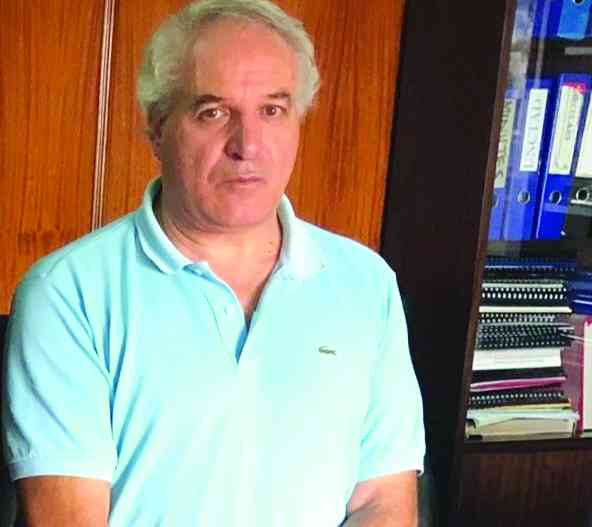
AN Italian businessman, Francisco Marconati, has approached the High Court seeking a review of two magistrates’ decisions, saying they violated procedures of good administration of justice.
In his application for review, Marconati, who runs Eagle Tanning in Marondera, cited magistrates Ruth Moyo, Simon Kandiyero, the State and the Judicial Service Commission as respondents.
Marconati was facing a charge of disorderly conduct together with his son, Allessandro, for which they were convicted and sentenced to community service.
They were ordered to perform the service at Inyathi Police Station in Matabeleland North province.
However, Marconati, who was facing another matter at the Harare Magistrates Court, was arrested at the court by officers from Braeside Police Station, who indicated to him that they had a warrant of arrest, but did not produce it.
Marconati submitted that while at the police station officers showed him a copy of the warrant of arrest which was in the phone of one of them which was purportedly issued by magistrate Moyo.
The warrant indicated that he had not performed community service and he was detained in cells.
Marconati said he questioned the veracity of the warrant of arrest saying there was no order for his detention and that the procedure used was wrong and pleaded for his release, but the police officers did not listen to him.
- Local online publication sued over defamatory stories
- Businessman approaches High Court over magistrates ruling
Keep Reading
On June 11, Marconati was taken to court and prior to appearing before the magistrate, his lawyers requested the evidence on whose basis magistrate Moyo issued a warrant.
The letters from the State and director of community service were submitted in court, but annexures with the entry of hours were allegedly excluded.
Requests to have them submitted in court since they formed the basis of the allegations were futile.
Marconati said at that stage, he began to notice that the whole process was calculated to ensure that he would be detained in remand prison.
At the hearing, Marconati’s lawyers raised some issues, such as that the record was incomplete and that the court could not competently proceed with the inquiry, as well as the arrest unlawful.
They said the procedure adopted was wrong and was outside the four corners of section 350D of the Criminal Procedure and Evidence Act and the Community Service (General) Regulations 1998, adding that there was no record on how the warrant of arrest was issued.
Marconati argued that there was no statement on oath tendered in the court, stating the allegations or basis of the allegations by the official who supervised him and that any evidence to the contrary would not be proven in the absence of the authority responsible.
He also argued that the information placed before the court was insufficient and incomplete and that there was no statement obtained from the supervisor complaining about his actions or anything whatsoever.
Marconati submitted that Kandiyero initiated the investigations from a letter written by the director community service, yet the regulations provides a different process where the clerk of court in conjunction with the community service department and with the involvement of the supervisor is supposed to be at the centre stage.
The applicant submitted that magistrate Kandiyero had become alarmingly biased and his interest could not be ignored, yet justice must not only be done but must be seen to be done.
“The supervisor has the discretion to grant leave of absence and nothing was presented on record to show that he had not done so and that my actions were a frolic of my own.
“The court had been subjected to an administrative court yet its jurisdiction is criminal,” the submissions read.
Marconati said he performed 91 hours out of 105 hours, adding that there were genuine reasons for his failure to perform the remaining hours because he was in court attending to other matters and also that he had travelled for a medical check-up to Italy.
“Despite all the facts above, (magistrate) Kandiyero proceeded with the enquiry and caused my detention for more than three days. Instead, Kandiyero postponed his ruling to June 12, 2024,” Marconati said.
“On June 13, 2024, I was brought to court. Surprisingly, members of the State requested to tender additional evidence. They decided to produce the piece of evidence that they had declared unavailable and ignored in their submissions.
“I have since complied and completed the remaining 14 hours. To the contrary, it is my position that the process was riddled with gross irregularities that ought to be corrected in this honourable court.”
Added Marconati: “It is also my averment that the process was calculated to persecute me instead of correcting any wrong or injustice for some of the following reasons:
“Complainant in the matter and myself were business partners and live-in partners. However, both relationships have gone sour due to several reasons, which include misappropriation of company funds by the complainant.
“I dismissed complainant as a director in 2021 upon having discovered that complainant was misappropriating company funds. Since 2021, complainant has taken me to court, but to no avail, apart from the case of disorderly conduct, being the frame to breach of community service order enquiry under review, which I am appealing under HCHCR 2664/24.”
Marconati submitted that the complainant Li Song wants to see him suffer and force him to withdraw charges of externalisation which she is facing in the criminal court.
“I have made it clear that I will not because the case is of national importance and involves funds belonging to the government of Zimbabwe. Complainant also wants to force her hand back into the directorship of the company,” the Italian businessman averred.
“As such, complainant through her influence has been manipulating systems to her benefit, pushing, inducing and pressurising people to prosecute me when there are no grounds whatsoever.
“In the matter in the court a quo (lower court), there were too many errors which made me suspect abuse of office and undue influence. As a result, I caused my lawyers to raise a complaint at Zacc [Zimbabwe Anti-Corruption Commissioner], investigations are still pending.
“However, it is my understanding that this application cannot wait because it is separate to the investigations carried (out) by Zacc and also it is an important application that allows the court to preserve the integrity of the justice system in Zimbabwe by ensuring that the correct procedures are followed and that court officials must always exercise their independent judgment.”
Marconati said his grounds for appeal were that magistrate Moyo was absent from work when the warrant purported to have been signed by her was used.
He submitted that magistrate Moyo erred in signing a warrant of arrest when there was no sworn statement before a magistrate alleging a reasonable suspicion for the violation of a law.
He said his arrest was carried out on an invalid warrant.
“Denial of bail was inconsistent with the law governing granting of bail. There is no law that a person arrested on a warrant of arrest cannot be granted bail. That clearly is a gross misdirection. The court ought to have guided itself with the law, but it did not.
“I aver that the entire proceedings were invalid and ought to be set aside and declared such in the face of facts laid out above. This application is merited and I pray that it may be granted,” Marconati submitted.











